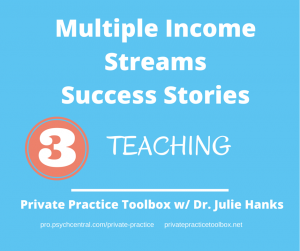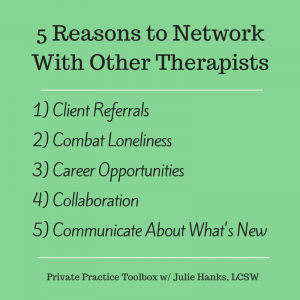As healers, we genuinely like to do our work. Guiding clients through the therapy process and seeing them make progress is why we do what we do. But if you're in private practice, you know there's a lot going on in the back end and that it's crucial to run an efficient and organized business.
Private Practice Website: Should You Hire a Pro or DIY?
As therapists in 2016, we understand that having a functioning, informational, and attractive website isn’t just a good idea-it’s a necessity. But if you’re just starting out in private practice, it can be intimidating to build one from the ground up. How do you design your home page so a user can easily navigate and find what they need? How do you present information in a way that isn’t overwhelming or too “busy”? What’s the best way to make sure your content is mobile-friendly? And even when you figure out the answers to these questions, how do you make the vision in your head actually become reality on a website?
4 Questions To Ask Yourself When Hiring a New Therapist
 One of the wonderful challenges that comes from having an abundance of business is the need to add new additional clinicians to your practice. But how exactly do you know who will be a good fit? How can you be sure to make the best choice that will benefit both the clients and your practice?
Not too long after opening Wasatch Family Therapy, I had created relationships in my community and built my online presence to the point that the demand for my services exceeded the supply I could provide. In other words, I needed to hire new therapists! Since I do not have a background in business, the process was entirely new to me, but thankfully I found that it happened quite naturally. I identified a few key criteria (beyond simply having required credentials and experience) that a candidate must possess in order for me to feel like he/she was a good enough match to hire. Here are 4 questions to ask yourself when meeting with an applicant who you may potentially bring in to your practice:
One of the wonderful challenges that comes from having an abundance of business is the need to add new additional clinicians to your practice. But how exactly do you know who will be a good fit? How can you be sure to make the best choice that will benefit both the clients and your practice?
Not too long after opening Wasatch Family Therapy, I had created relationships in my community and built my online presence to the point that the demand for my services exceeded the supply I could provide. In other words, I needed to hire new therapists! Since I do not have a background in business, the process was entirely new to me, but thankfully I found that it happened quite naturally. I identified a few key criteria (beyond simply having required credentials and experience) that a candidate must possess in order for me to feel like he/she was a good enough match to hire. Here are 4 questions to ask yourself when meeting with an applicant who you may potentially bring in to your practice:
-
Do I like him/her?
It may seem obvious, but it's critical that you feel comfortable with an individual who may be working for you. If you do not like to be in his/her presence, why would a client? It goes without saying that people skills are invaluable in this profession; it's what we do! Look for someone who puts you at ease, is warm and inviting, and who you find yourself attaching with. Be mindful of the emotional climate of your practice; you want to bring someone in who will work well with others, avoid drama, and of course help clients through their emotional struggles. Whether or not I genuinely like someone is the most important factor determining if I hire him/her (interestingly, this same criteria is also usually first on the list of what a client looks for in a therapist).
-
Were they born to be a therapist?
When looking to add to my practice, I look for individuals who I can sense were born to do therapy. It's common for practitioners to work with a lot of graduate level interns, and there are a select few who truly stand out; people who are naturally thoughtful, reflective, and sensitive to others' needs and feelings. I want someone who's always had the intuition and instinct of a therapist who just had to go through the official training to actually become one.
-
Are they emotionally stable?
This question is admittedly a bit delicate. While no one has it all together all the time, it naturally follows that someone who has a handle on his/her emotional issues can better assist clients in managing their own. Good therapists often use difficult past life experiences to relate to and help clients, so being "emotionally stable" doesn't necessarily mean you've never struggled mental health or relationship problems; quite the opposite can be true! To use an analogy, you cannot be a tour guide for other people to places you've never traveled. Still, I need my therapists to be healthy in order to best serve our clients.
-
Do they reflect the values of my practice?
As the owner of my practice, I need therapists who work for me to be similar to me in many ways. This is not to say, of course, that I am wanting someone with the exact personality, training, and expertise that I have. Still, there needs to be a continuity of approach and therapy style common to our clinicians. Throughout the years, we've had inquiring individuals wanting to see me specifically after hearing me speak or learning about me through social media. When I don't have an available opening to see someone new, I like to be able to state my confidence in another therapist and tell the prospective client that I've hand-selected a particular counselor that I wholeheartedly trust to do good work. I suggest that practitioners looking to hire new therapists identify a few specific values that are key to the philosophy and setting of their private practice to look for in applicants.
What do YOU look for when hiring new clinicians?
Let me know!
This post was adapted from an interview I did with Joe Sanok, LPC on" Practice of the Practice." Click here for access to the full podcast.
Join my Private Practice Toolbox Facebook group and connect with over 3100 therapists around the globe in 2 simple steps: 1) Click request to join the group and 2) Fill out this brief questionnaire before you’ll be added to the group.Get practice tips and blog updates in your inbox.
Get 52 FREE Blog Topics and prompts when you sign up for the PPT Newsletter (that’s a year's worth of weekly blog posts!)
 Want to grow your practice and make a difference beyond the therapy office? Check out my NEW Rock The Media School for Therapists - a 6-week online media + social media training designed for health and mental health practitioners. Learn how to build your media and your online presence so you can share your passion and practice with thousands of people! I hope you'll join me. Fall cohort begins Sept. 7, 2015.
Want to grow your practice and make a difference beyond the therapy office? Check out my NEW Rock The Media School for Therapists - a 6-week online media + social media training designed for health and mental health practitioners. Learn how to build your media and your online presence so you can share your passion and practice with thousands of people! I hope you'll join me. Fall cohort begins Sept. 7, 2015.
Multiple Income Stream Success Story #3: Teaching
 As we highlight more opportunities to use things that you enjoy doing and instances where others request your services to generate multiple income streams, I am sharing stories of other practitioners who have found ways to do just that:
We often forget that we have achieved at least a master's level education that can qualify us to teach others. There are many opportunities out there for teaching. Consider these options if teaching others is a passion for you. Teaching university or college courses, online courses or webinars, community workshops, or professional trainings.
As we highlight more opportunities to use things that you enjoy doing and instances where others request your services to generate multiple income streams, I am sharing stories of other practitioners who have found ways to do just that:
We often forget that we have achieved at least a master's level education that can qualify us to teach others. There are many opportunities out there for teaching. Consider these options if teaching others is a passion for you. Teaching university or college courses, online courses or webinars, community workshops, or professional trainings.
Getting started with teaching can be very easy; start with who you know. Contact your alma mater or other nearby colleges and universities. Many universities have positions available for adjunct faculty to teach entry level classes or to offer professional trainings to students in your field. Keep in mind, these types of teaching commitments usually last for extended periods, so be sure that they work for your timeline and make sense financially.
Presenting or developing online courses or webinars can be an easy, passive source of income. Once a training has been developed, you can easily record it and make it available for download or schedule various presentation times to virtually present it to others. This is an excellent area where your expertise can lead you to topics or needed courses. It also allows you the opportunity to reach well beyond the scope of your geographical location.
Starting small can often lead you to bigger opportunities and income growth. Consider providing small trainings at your practice for continuing education credits. Pam Dyson, MA, LPC, did just that when starting her play therapy trainings. When Pam originally started with trainings, it worked out to about 25% of her income. As those trainings became more successful Pam grew those trainings to the point where they provide 75% of her income. Pam shares this about her experience in growing teaching as an income stream.
“In 2010, I became an Approved Provider for the Association for Play Therapy. I began by offering a day long play therapy training, once a month, out of my private practice office, where attendees could earn the clock hours needed to become an RPT. I set up a website to promote the trainings, and within a year I was at capacity for each training. To meet the demand, I began offering four day-long trainings per month."
If you would like to learn more about Pam Dyson and the trainings that she offers, please visit DFW Play Therapy Training.
Community workshops are another area where teaching can be a beneficial source of income. Workshops are excellent because they often don't take much time to develop and also only last for brief periods. In my practice, we have sometimes taken areas or groups of individuals who have a need for instruction in a particular area and turned that into a workshop. I have done this when I see a consistent or similar problem in my clientele. At one point, I was working with many women who were suffering from a lack of sex drive. I developed a workshop for cultivating desire in marriage that I would present for a few hours every few months.
I encourage you to keep in mind doing those things that you are passionate about. Teaching may not be your cup of tea, but there are plenty of other ways to generate multiple streams of income. If you're still having trouble coming up with something, refer back to my 5 Key Questions to help you get started.
Visit the new PrivatePracticeToolbox.net for webinars and consulting services
Visit the new PrivatePracticeToolbox.net for webinars and consulting services
FREE Download Get 52 Blog Post Topics & prompts when you sign up for PPT list
Join my Private Practice Toolbox Facebook group and connect with 3200 therapists around the globe in 2 simple steps: 1) Click request to join the group and 2) Fill out this brief questionnaire before you’ll be added to the group.
5 Reasons to Network With Other Therapists
 As therapists, it’s easy to become isolated. We see our clients, fill out paperwork, perhaps read a book or two to brush up on certain skills, then go home. I certainly don’t mean to imply that the work of a clinical counselor is rote or is not stimulating, but as the nature of therapy is very private, it’s quite possible to get into a routine that greatly limits our interaction with other professionals.
As therapists, it’s easy to become isolated. We see our clients, fill out paperwork, perhaps read a book or two to brush up on certain skills, then go home. I certainly don’t mean to imply that the work of a clinical counselor is rote or is not stimulating, but as the nature of therapy is very private, it’s quite possible to get into a routine that greatly limits our interaction with other professionals.
Through my 13 years in private practice and 20+ years in the mental health field, I have come to understand the power of networking with like-minded professionals. Networking is cultivating relationships to facilitate the exchange of information (which may be related to the nature of the profession and/or to career and employment). For our purposes, it simply means being in frequent and meaningful contact with other therapists! This strategy has greatly benefited my practice and also me personally and professionally in numerous ways.
Here are 5 reasons to get out of your office and begin networking with other therapists:
1) Client Referrals
Perhaps you've recently opened your practice and need to build your clientele. If you know others in the area and have begun to create those relationships, you have a valuable resource to draw upon. Introduce yourself to other practitioners in your area in case they know anyone seeking a therapist with your speciality (it's not self-serving; it's smart). Conversely, if you have a thriving practice and have the wonderful dilemma of having a higher demand for your services than you are able to provide, generously referring out is a way you can serve individuals even though you are not seeing them as clients. Network to learn of others you can contact if/ when this occurs.
2) Combat Loneliness
We teach our clients about the importance of self-care, but are we tending to our own emotional needs as well? We understand from attachment theory that we innately need connection with others; isolation is quite literally a form of torture, and many therapists I've worked with feel a real sense of disconnection seeing only clients all day. Reach out to others in order to fight loneliness and feel emotionally supported (read more here about this idea).
3) Career Opportunities
Beyond your work as a clinician, you can use your skills and talents to serve your community in other ways (such as through writing or consulting), and many of these opportunities present themselves through your relationships with others. Perhaps a colleague has suggested or inspired you to expand your activities. Networking has brought me personally many opportunities that I wouldn't have otherwise had. It's quite amazing the possibilities that can open up to you if you devote time and energy to cultivating those professional connections.
4) Collaboration
Going along with the previous point, finding ways to apply your skills other than by seeing clients is often best done in collaborative efforts. Combining your knowledge and experience with others in the mental health field is a great way to enrich and contribute to the professional community while simultaneously expanding your outreach. This very blog is infinitely more valuable because it contains not only my experiences, but those of others with whom I've networked and created relationships. Reaching out and working with others in the field can enhance your career accomplishments.
5) Communicate About What's New
If you're sitting in your office all day with only minimal contact with the outside world, it's unlikely that you'll hear about new developments in the field. But through continual networking and staying in touch with other clinicians, you can become aware of and familiar with new therapies and strategies that may enhance your practice. Regular contact with others can help you keep abreast of these new ideas, and you as well can offer your feedback on current topics and controversies relating to therapy.
What are reasons YOU network with others?
How has networking benefitted you?
Stay tuned for an upcoming post about therapist-friendly strategies to effectively network.
Visit the new PrivatePracticeToolbox.net for webinars and consulting services
Get 52 FREE Mental Health Blog Topics and prompts when you Sign up for the Private Practice Toolbox Newsletter here.
Join my Private Practice Toolbox Facebook group and connect with 3200 therapists around the globe in 2 simple steps:
1) Click request to join the group and
2) Fill out this brief questionnaire before you’ll be added to the group.

As healers, we genuinely like to do our work. Guiding clients through the therapy process and seeing them make progress is why we do what we do. But if you're in private practice, you know there's a lot going on in the back end and that it's crucial to run an efficient and organized business.